April 10, 2024 – Pittsburgh, PA – April is an exciting month: It’s Earth Month, the redbud trees and wildflowers are blooming, we’re planting trees in communities and readying our preserves for warm-weather visitors, and much more. At WPC, we celebrate Earth Day 365 days a year! Read on to discover some ways you and friends, family or coworkers can get involved with the Conservancy to care for nature near you.
Enjoy the Redbuds and Plant Trees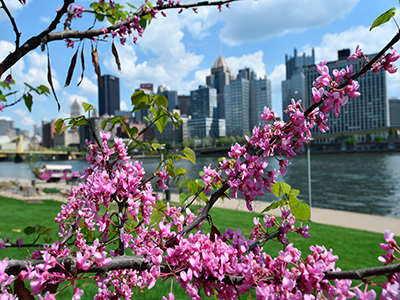
Nearly 4,000 Eastern redbud trees and complimentary trees planted through the Pittsburgh Redbud Project are budding and blooming along Pittsburgh’s rivers and downtown, displaying bursts of pink and providing early food for pollinators. Check out Visit Pittsburgh’s blog about the redbuds to find a map displaying locations where you can enjoy the blooms, or download beautiful free images of the redbuds at iconic Pittsburgh locations for your virtual backgrounds. Join our Emerging Leaders for Redbuds & Brews: Volunteer to care for redbuds and other trees on the North Shore on June 11,2024, then join us for happy hour!
Speaking of trees, in April we will celebrate the milestone of 40,000 trees planted through our community forestry program! Since 2008, with the help of partners and volunteers, 73 City of Pittsburgh neighborhoods, 57 municipalities across Allegheny County and other towns in our region have benefitted from our efforts to plant more trees to increase and sustain healthy urban forests. Volunteer to plant trees in your community during April.
Trees planted along streams—riparian trees— filter pollutants before they enter the water and help prevent streambank erosion, improving water quality for humans and aquatic wildlife. We need volunteers to plant thousands of riparian trees in several counties. Learn more and register.
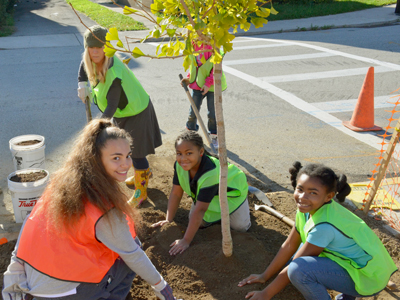 Plant Gardens and Care for Land
Plant Gardens and Care for Land
We’re preparing to plant our 130 community flower gardens that provide bursts of color in neighborhoods throughout the region. Bring friends, coworkers or family to volunteer to plant the flowers that feed and shelter bees, birds and small wildlife. We also need year-round volunteer garden stewards to keep the gardens looking great and free of weeds and debris. Perhaps your company, family or organization would like to sponsor a garden!
Those combined efforts combined help to support native pollinators. Consider supporting bees, butterflies and other pollinating insects in your own backyard! Learn about bees and other pollinators, and the plants that nourish them, in our free recorded webinar, “Pollinator Habitat: Build It and They Will Come.”
Do you enjoy hiking and wildlife and bird watching? Volunteer as a land steward on a WPC preserve! We manage nearly 15,000 acres on 44 nature preserves for everyone to enjoy. Our volunteers help us manage invasive plants, keep trails clear and even develop trails. Groups are welcome.
Attend Webinars
Caring for Earth also means caring for wildlife, including our feathered friends. Bird populations in North America have been declining since 1970 due to many factors, including window collisions and habitat loss. Learn how you can protect birds: Register for our upcoming free webinar, “Seven Simple Ways to Help Our Birds,” April 25 at noon.
Watch other free, recorded webinars about WPC’s work, including planting water-thirsty trees and flowers for pollinators, restoring streambanks and much more.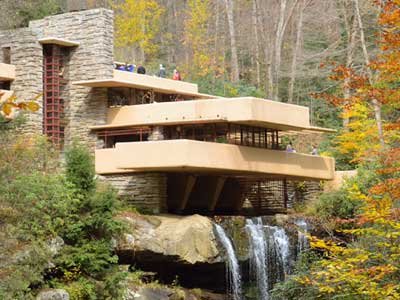 Discover steps you can take to green your community or improve or protect water, land and wildlife.
Discover steps you can take to green your community or improve or protect water, land and wildlife.
Register to join Western Pennsylvania native and geologist Dr. Fred Zelt on April 18 at noon for a fascinating and educational free webinar about the art and science of Fallingwater’s organic design, “The Geology of Fallingwater.” Fallingwater is an architectural symbol of humans living in harmony with nature. Its organic design is rooted in geology. Built of very special local stone, Fallingwater’s organic design incorporates large boulders and rests on bedrock. Cantilevered over a stream and waterfall, the house features stories and balconies that echo underlying rock strata.
Volunteer at Fallingwater
Fallingwater is an architectural symbol of people living in harmony with nature. If you’re passionate about Fallingwater, consider volunteering. Use your skills in a rewarding setting with others who share your love of architecture and the great outdoors. Ask Me Guides, museum store, café, visitor services and landscaping are just a few of the many options. Learn more and apply.
Protect Biodiversity and Combat Climate Change
Invasive species – non-native species that do not occur naturally in an area and grow quickly and aggressively – out-compete native species for food, habitat and other limited resources. A leading cause of biodiversity loss worldwide (after habitat loss), invasive species can cause the extinction of native plants, animals, fungi and microorganisms. Invasive species are widespread: in forests, cities and backyards and local rivers and streams. The good news: You can help combat invasive species to help native species thrive! Get some tips.
Lake Erie, one of the most picturesque landscapes and important ecosystems in Western Pennsylvania, is at risk from aquatic invasive species. In the 44-minute film “Seeing The Unseen: Aquatic Invaders & What’s at Stake,” executive produced by the Western Pennsylvania Conservancy’s Pennsylvania Natural Heritage Program staff, learn how hundreds of aquatic invasive species are negatively affecting Lake Erie and its watershed and the work being done to raise awareness about and mitigate the risks from invaders.
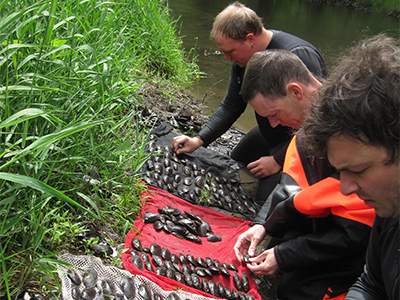 Biodiversity is the variety of plant and animal species associated with each other in a given habitat. In our Winter 2023 Conserve, read about our work to protect our region’s unique biodiversity and protect its most ecologically important places, and get tips on how to help biodiversity thrive. In our Summer/Fall 2022 Conserve, explore how climate change is affecting our region’s water, land and wildlife, and the work we are doing to address those concerns.
Biodiversity is the variety of plant and animal species associated with each other in a given habitat. In our Winter 2023 Conserve, read about our work to protect our region’s unique biodiversity and protect its most ecologically important places, and get tips on how to help biodiversity thrive. In our Summer/Fall 2022 Conserve, explore how climate change is affecting our region’s water, land and wildlife, and the work we are doing to address those concerns.
Get Outdoors and On the Water
Of course, getting outdoors and in touch with nature is a great way to appreciate Earth’s resources. During April and early May on WPC preserves an abundance of spring wildflowers will bloom, birds will be nesting and animals have emerged from hibernation. Please leave the flowers for the bees to enjoy and stay on the trails for your safety and to protect wildlife and plants. Before your hike, please limit the spread of invasive plants by cleaning your shoes with a small brush or using a boot scraper provided at the trailhead of some preserves.
Are you excited to get on the water this spring? Put your canoe or kayak on the water at one of the 94 completed canoe access sites funded by WPC in the region. Plan your next adventure and discover trips on local streams. Does your community need a canoe access site, or does an existing site need improvements? Apply through April 26 for Canoe Access Development Funds for up to $5,000.
Get Earth-friendly Tips
And finally, check out some great, practical Earth-friendly tips from WPC staff that you can use in your home or backyard. From composting, installing a rain barrel and planting a garden, to thrift shopping and biking to work, our staff provides plenty of ideas to help you help the Earth!
Help Protect Nature Near You, 365 Days a Year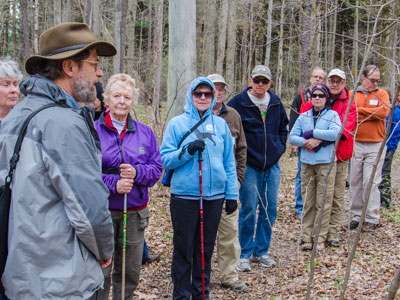
Becoming a member and continuing to engage with WPC is a great way to care for the Earth year round. Join WPC in April and you and your family can attend Members’ Day on May 4 at the Barn at Fallingwater!
Thank you for all you do to make Western Pennsylvania a wonderful place to work and live, during Earth Month and all year long. Together, we can conserve and nurture our water, land, forests and wildlife and help protect our natural home.
###
About the Western Pennsylvania Conservancy:
The Western Pennsylvania Conservancy (WPC) enhances the region by protecting and restoring exceptional places. A private nonprofit conservation organization founded in 1932, WPC has helped establish 11 state parks, conserved more than 285,000 acres of natural lands, protected or restored more than 3,000 miles of rivers and streams, and assessed thousands of wildlife species and their habitats. The Conservancy owns and operates Frank Lloyd Wright’s Fallingwater, which is on the UNESCO World Heritage List and symbolizes people living in harmony with nature. In addition, WPC enriches our region’s cities and towns through 130 community gardens and other green spaces and thousands of trees that are planted with the help of more than 7,000 volunteers. The work of the Conservancy is accomplished through the support of more than 10,000 members. For more information, visit WaterLandLife.org or Fallingwater.org.
